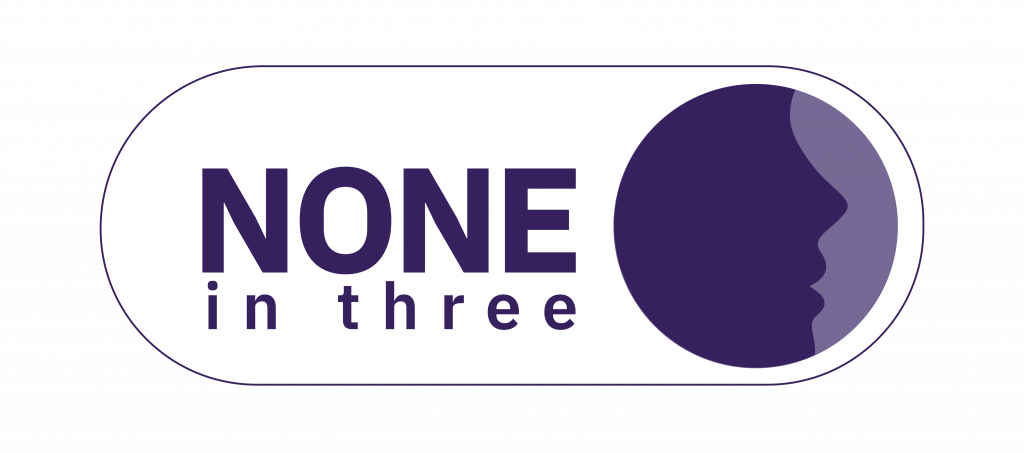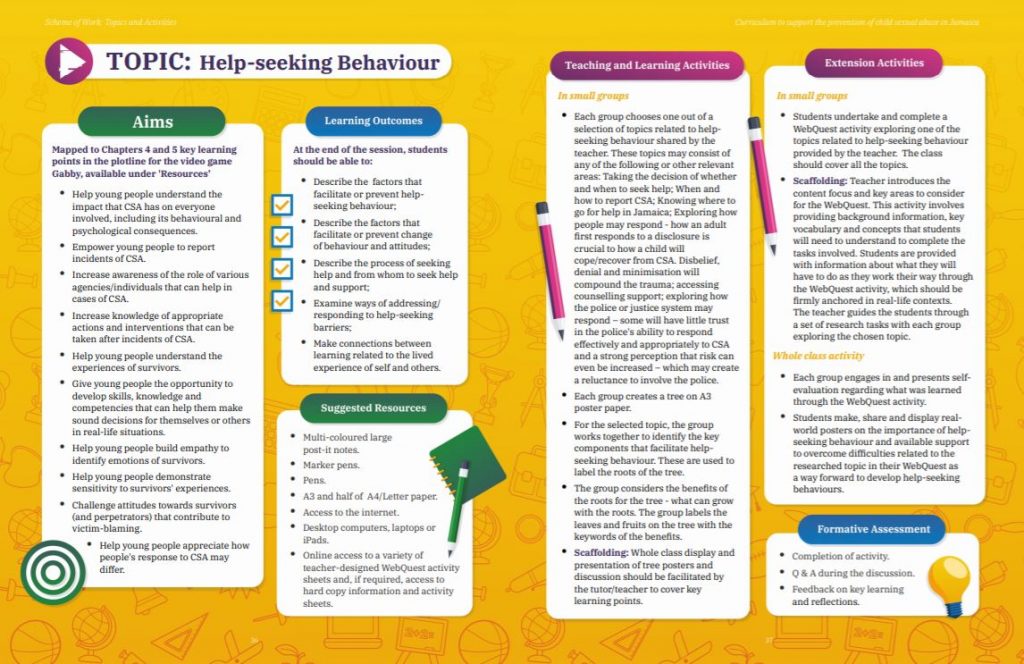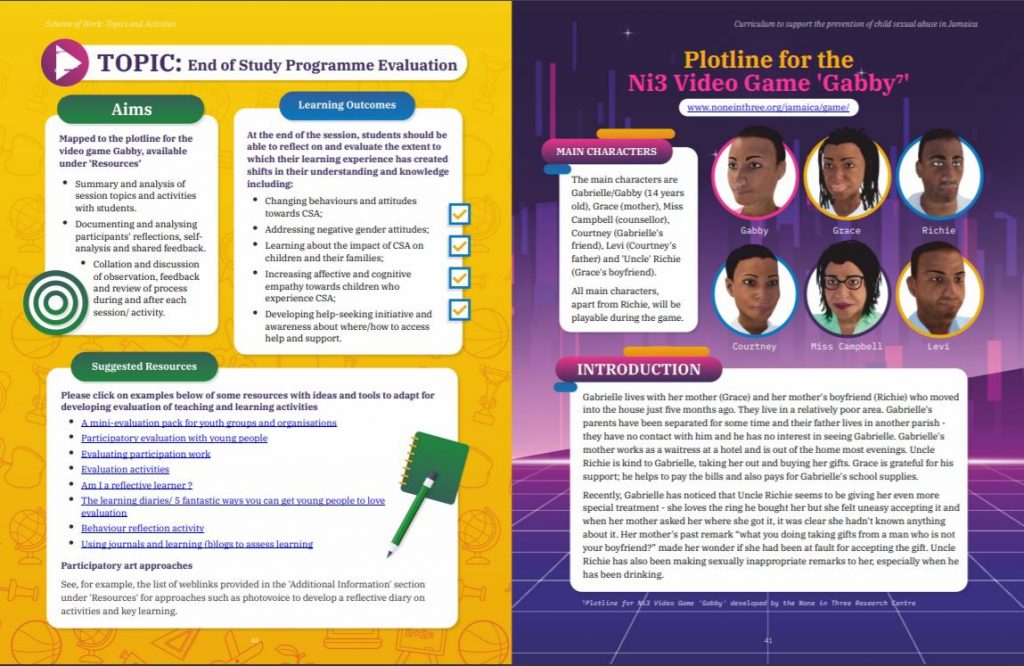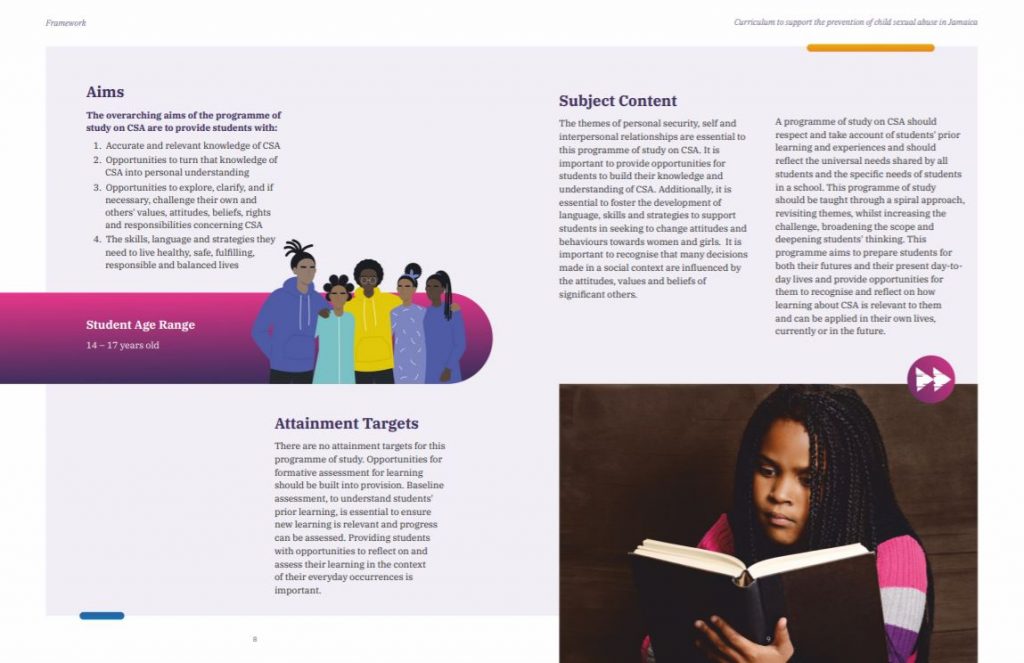None in Three Newsletter Issue #6
May 2021

May 2021
None in Three (Ni3) is a global research centre for the prevention of gender-based violence (GBV).
The name None in Three comes from the statistic that one in three women around the world will experience some form of physical or sexual violence in their lifetime. We believe this is an unacceptable number; that any violence against women and girls is not OK, and we work to make that number NONE in three.
GBV is the term used to describe harm inflicted upon people that is connected to how their gender is understood within their culture. We research different forms of GBV and are developing interactive computer games as educational tools for young people, to be played in schools.
Through these games we aim to effect meaningful cultural change. We work to change attitudes and behaviours that relate to different types of GBV, including sexual abuse; adolescent dating violence; gender bias and its relationship to gender-based violence; and child marriage.
We are passionate about making a difference. Through our work we are striving to change the behaviours and attitudes not only of individuals, but of governments too.
We seek to achieve real-world impact through our research. We want to persuade governments to listen to the facts about GBV, to accept the extent of the problem, to acknowledge how many women and girls are being abused, and to act in order to change this.
We welcome the support of like-minded organisations who share our commitment to preventing violence against women and girls.
If you would like your organisation to be listed on our website as a supporter of None in Three, please click here to complete a short online form registering your interest.
You can also get in touch by email on
noneinthree@hud.ac.uk
Welcome to the May 2021 None in Three newsletter. In this edition we focus on the educational curricula we are creating to accompany our schools-based, violence-prevention video games.
These curriculum documents are a key output from the None in Three project. They provide a supportive, structured framework for delivery of our educational games. They can also be used as standalone resources. They give teachers the tools they need to help students engage with challenging gender-based violence issues constructively, exploring themes in a safe environment, enabling deepened understanding and reinforced learning.
For this issue we interviewed Dr Priti Chopra and Professor Paul Miller, leaders of this strand of our work, together with Prarthana Patil and Dr Karyl Powell-Booth, representatives of our research teams based in India and Jamaica respectively, to gain an insight into the process of developing our curricula. Read on to find out more, and click the video links below to see and hear directly from each of them.
Providing a structured scheme of work that wraps around our games is central to enabling their uptake and leveraging their impact as effective, schools-based, anti-violence interventions.
Development of these schemes of work, as with None in Three’s foundational research, is rooted in nationally recognised gender-based violence issues that shape the lived experience of millions of children and young people.
In Uganda the game and associated curriculum content focus on child marriage, and sexual coercion surrounding it; in India, the focus is gender bias as an enabler of gender-based violence in and outside of the home; in Jamaica the topic is child sexual abuse in the home; and in the UK, abusive behaviours including coercion and control within teenage relationships.
Engaging with young people and actively involving them in a change process is central to our vision of preventing gender-based violence. Our use of innovative educational strategies to challenge negative gender attitudes while they are being formed empowers young people to develop the knowledge and skills they need to protect themselves, recognise and call out abusive behaviours, and to respect and support others.
The curriculum design and content is shaped by an interdisciplinary, youth-centred approach that draws on and combines:



Sample images of the current version of our curriculum for Jamaica, still under development
The objective is to create the conditions for inclusive, equitable and ethical teaching in a safe, boundaried learning environment. Through these curricula young people are given an opportunity to develop critical awareness of oppressive ways of being, relating to their own sense of self and others. They offer context-relevant activities for reflection and effecting change within self and others. A scheme of work with suggested topics and activities has been developed to tie in with themes and learning objectives within each ‘chapter’ of each of our prosocial games.
While we are developing separate curricula for each of our study countries, there are commonalities across all four. In each, we include suggestions for extension activities, formative assessment and locally accessible, low/no cost resources and activities. We have maintained a focus on understanding how support and intervention, and a lack of bystander intervention, can have powerful consequences for those living with experiences of gender-based violence. We focus on participatory and engaging activities for students as a way of creating sustained shifts in their learning, knowledge and attitudes.
Although there are common themes running across the curricular content, we have engaged in an iterative and collaborative development process, working with stakeholders, curriculum experts and research teams in each country. Pedagogical principles underpinning the design are combined with Ni3 country research findings to ensure cultural relevance and to create a unique approach situated within each national context. We referred to our reviews of existing literature on the research (and game) topic in each country, together with our own quantitative and qualitative research findings, to design a powerful, culturally relevant approach to learning.
Dr Priti Chopra, University of Greenwich, is leading on the development of our curriculum content for all four study countries
Professor Paul Miller is a member of the Board of the Commonwealth Council for Education Administration & Management and a member of the British Educational Leadership Society. He is a curriculum consultant for None in Three.
We believe this work has huge potential to change attitudes towards gender-based violence. For decades, governments, researchers and policy makers have tried various interventions to protect women and girls from violence within homes and the wider community. As we have seen from reviewing the literature, many of these interventions have had limited or no success. Our work offers a different approach to the challenge of tackling gender-based violence. By engaging with young people while their opinions are still forming, we have a real opportunity to instil in the next generation positive attitudes towards gender equality, together with a recognition of, and a desire to address, social injustice.
Our teams have engaged educational leaders in each country. We have worked with senior school leaders, government representatives and ministries of education. While it has, at times, proved challenging to reach the right people, we have been overwhelmed by the positivity with which our approach has been welcomed once we have been able to speak with key educational stakeholders, and are hugely grateful to all those who have taken the time to talk to us. There is widespread recognition that gender-based violence is a real and pressing issue, and that the work of None in Three represents a powerful new resource to help address it.
Our conversations with educational leaders and experts have proved invaluable in refining and improving our curricular materials. Conversing with school-based experts and policy makers within ministries of education has grounded and contextualised our empirical research and understanding of the cultural and policy environment into which our four games and educational curricula are designed to integrate. Having their input will – we hope – help enable wide take-up of our resources by schools beyond the life of our project.
This combination of the insight of researchers, committed to making change, with the practical, situated perspectives of educators, makes None in Three’s educational curricula powerful tools in the global struggle against gender-based violence.
Our curricula will be made available for free download from our website, following trialling of each of our games. Keep an eye on our games pages where we anticipate the Uganda curriculum will be the first to be launched in a just a few weeks’ time.
Young members of the None in Three team from India, Jamaica, Uganda and the UK are coming together to organise a free, two-day online conference focused on game-development as a powerful new tool in the global struggle against gender-based violence.
You can find out more on the Play. Talk. Change. website or book now to join us online on the 24th & 25th June 2021.
Our research in Jamaica aims to address the country’s crisis of child sexual abuse. This focus was arrived at through consultation with stakeholders and a review of existing literature on gender-based violence in the country, which highlighted child sexual abuse as a top area of concern in Jamaica and a nationally endemic problem.
We undertook large scale quantitative research with approximately 7000 children and young people, aged 10–18. This allowed us to explore the psychosocial and sociocultural dimensions of the problem. We also undertook qualitative research with adult survivors of childhood sexual abuse and with professionals working in the field.
Our research findings fed into the creation of an immersive, prosocial computer game: Gabby. The story of Gabby focuses on an adolescent who experiences sexual abuse by her stepfather. The game explores themes such as: what child abuse is; what grooming is; and the effects such abuse can have on individuals and the wider community. The game is designed to be embedded or integrated in the high school curriculum for young people aged 14–17. The scheme of work for Jamaica is designed to create a supportive environment for these young people as they encounter Gabby and her story, with the aim of effecting meaningful change in their attitudes towards childhood sexual abuse and gender-based violence more generally.
The curriculum is expected to take approximately 100 minutes to deliver, most likely over two classroom based sessions, but with a rich selection of resource materials and guidance provided for teachers to choose from and to extend into further learning sessions as desired. It is designed to be delivered by trained guidance counsellors or other designated teachers. The game and the curriculum combined will help students to develop empathy for those who may have experienced abuse, and to learn more about appropriate and inappropriate relationships.
To the best of our knowledge, this is the first time that this approach has been taken towards this issue in Jamaica and we are excited about being able to conduct schools-based trials of both the game and the curriculum as soon as it is safe to do so.
Our research in India focuses on the country’s deep-rooted gender bias and the effect this has on the prevalence and severity of gender-based violence. We aim to challenge the patriarchal assumptions that underpin gender bias and which are the underlying cause of a number of issues, including the country’s high incidence of domestic violence and child sexual abuse.
One of the biggest challenges has been working within the complicated context of education and curriculum design in India. Ever since the 19th century there has been an ongoing and unresolved conversation about the kind of curriculum and the kind of education system that is needed in India. However, there is a growing realisation that real world issues need to be addressed in the classroom, including gender bias.
Our curriculum for India is all about empowering young people to focus on life skills and to develop the independent, positive critical thinking skills they will need to respond effectively to real-world social issues they will encounter throughout their lives. This kind of practical, grounded education is a much needed innovation in India. Gender bias is part of daily life for many young people; they encounter it in their homes, in their families and in their wider communities.
One of the key requirements is that our curriculum meets the practical needs of teachers and students. For example, by moving beyond textbooks and traditional learning we are creating a robust yet flexible scheme of work that can be adapted to a range of scenarios. These conversations about gender bias can take place anywhere, both inside the classroom and outside. We are giving teachers the freedom to develop these ideas in the classroom. Our curriculum is largely activity based, rather than reliant on written examples. We believe this will create significant capacity within the education sector to deliver these sessions. Activity-based learning will also make the sessions more relatable and memorable for participants.
Although the current crisis in India has, sadly, hampered our ability to conduct a school-based trial of our game, we are confident that the work we are doing in India will move the conversation forward in terms of eliminating gender bias by engaging with young minds and guiding them towards a more positive future.
Dr Karyl Powell-Booth, University of Technology, is our research fellow for the None in Three project in Jamaica
Prarthana Patil, Indian School of Design & Innovation, is Co-Country Director for the None in Three project in India
Professor Melinda Lemke is an Assistant Professor in the Department of Educational Leadership and Policy, in the Graduate School of Education at the University at Buffalo (UB) – State University of New York. She is a member of None in Three’s International Advisory Group.
Visit Professor Lemke’s profile for more information.
Gender-based violence (GBV), and in particular sexual violence, arguably is one of the most pressing issues involved in schooling today. Decades of empirical and practice-based evidence underscore that violence-induced trauma not only impairs student development, but has lasting negative effects in adulthood. In the United States, sexual violence is common among adolescents, with disproportionate rates reported among young women and girls within LGBTQ+ and BIPOC (Black, Indigenous, People of Color) communities. Research concerning school-based trauma-informed programming (TIP) currently aims to augment educational practitioner knowledge about vulnerability, signs of distress, and ways to avoid triggering memories that prompt student re-traumatization. Research and best practices also emphasize the benefits of culturally and linguistically responsive (CLR) TIP, or programming that accounts for differences in experience due to racial, ethnic, gender, socioeconomic status, nationality, language, and other identity markers.
Within some educational settings, such trauma-informed “plus” approaches often are implemented by staff with deep knowledge of student populations, their histories of violence and survival, and respective health needs. Still, even with increased awareness, will, and capacity to address GBV, research finds that educators want and need better training on GBV, and as relevant to youth sexual violence. Crisis services practitioners, including those entities within the U.S. that respond to and provide services for victims and survivors of GBV, also identify gaps in school-level policy and practice focused on sexual violence prevention. These gaps include for example, problematic prevention protocols that reinforce rape culture as opposed to prosocial youth behaviors, and inadequate resources and proper reporting mechanisms when sexual violence occurs. Finally, although U.S. elementary, middle, and high schools are bound by certain federal policies and respective protections concerning GBV (i.e. Title IX), at the state level, educational policies concerning GBV, and sexual violence specifically, can be limited in articulation and provision. They also are known to be inconsistently implemented between schools within the same school district and between districts within the same state.
Thus, it is integral that discussion of GBV, and respective identification and prevention, be centered in educator certification requirements and routine professional development. This also should be a core feature in any student sexual health education coursework. Among other content topics, this should include the warning signs of unhealthy relationships, knowledge of rights and responsibilities as to what constitutes a GBV offense and reporting procedures, and victim resources. Training and coursework also must address continued high rates of sexual violence and commercialized exploitation within historically minoritized and underserved communities, as well as the systemic, structural, and institutional contributors to such violence.
If your organisation may be willing to provide financial or in-kind support for getting our anti-violence computer games into schools, e.g. through the provision of laptops, please contact us.
We are currently progressing with analysis of the data from our survey of around 30,000 young people aged 10-18 across four countries. This ground-breaking piece of research will help to reveal a true picture of children’s experiences of violence and abuse, and the impacts those experiences are having on the next generation.
In our next newsletter, we will share some of the insights from this work.
Visit our online hub for Impact Dissemination and Engagement Activities (the IDEA) related to None in Three’s research, including latest news, publications, video and social media content.
None in Three is funded through the UK government’s Global Challenges Research Fund and the University of Huddersfield. The global research centre is based at the University of Huddersfield and its work is currently being delivered in partnership with: Idealists Consulting, Mumbai; ISDI School of Design and Innovation, Mumbai; UTech, Jamaica; Makerere University, Uganda; and the University of Sheffield, UK.